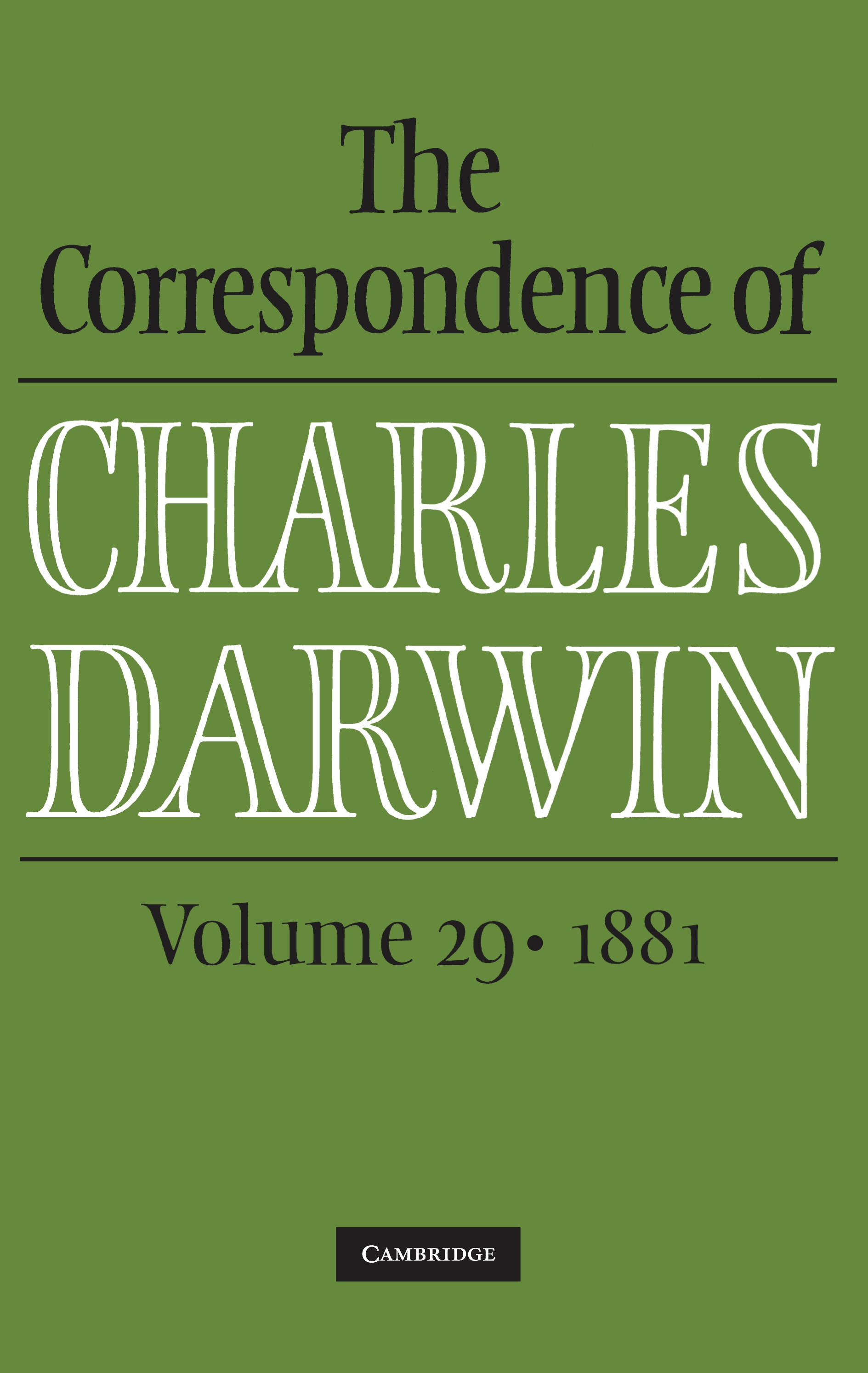From the start of 1881, Darwin had his demise on his mind. He increasingly relied on his son William for help with his financial affairs and began to make provision for the dividing of his wealth after his death. Darwin's gloominess was compounded by the decline of his brother, Erasmus Alvey Darwin, who, after several bouts of illness, died in August. Despite this blow, and intimations of his own heart disease in December, Darwin's spirits improved towards the latter part of the year. The enthusiastic reception of his book on earthworms, published in October, was a boost. His 5-year-old grandson Bernard, who lived at Down House, remained a continual source of delight. A second grandchild was born in December. Old friends and new admirers got in touch, and, for all his fears, Darwin found several scientific topics to pursue.
Volume 29 of the Correspondence of Charles Darwin is now available.
Read more about Darwin's life in 1881 in our Life in letters series.
Highlights of the year recorded in the letters include:
I am driven almost frantic by the number of letters about worms; but amidst much rubbish there are some good facts & suggestions. So I have sent for clean sheets & shall make an amended edition. It is laughable the enthusiasm with which the book has been received. Letter to Francis Darwin, 9 November [1881]
In October 1881, Darwin published his last book, The formation of vegetable mould through the action of worms: with observations on their habits. A slim volume on a subject that many people could understand and on which they had their own opinions, it went through several reprints within a year. The idea of the powerful effects brought about by apparently insignificant creatures caught the public imagination.
I hardly ever wished so much for anything in my life as for its success. Letter to A. B. Buckley, 4 January 1881
In January, Darwin heard that his efforts to secure a civil list pension for Alfred Russel Wallace, co-discoverer of the theory of natural selection, had been successful. Wallace's friend Arabella Burton Buckley had suggested the possibility, and Darwin, with her help, wrote a memorial on the subject, secured suitable signatories, and sent it to the prime minister, William Gladstone. Wallace was relieved and delighted: 'There is no one living to whose kindness in such a matter I could feel myself indebted with so much pleasure & satisfaction.'
Idleness is downright misery to me, as I find here, as I cannot forget my discomfort for an hour. I have not the heart or strength at my age to begin any investigation, lasting years, which is the only thing, which I enjoy, & I have no little jobs which I can do. Letter to J. D. Hooker, 15 June 1881
The Darwins spent June in the Lake District, a family holiday which Darwin contemplated with his customary despair. He admitted that the scenery was 'magnificently beautiful' but complained of the cold and mist. Evidently he was happier back in Down, where the artist Marianne North visited in July: 'He sat on the grass under a shady tree, and talked deliciously on every subject to us all for hours together, or turned over and over again the collection of Australian paintings I brought down for him to see, showing in a few words how much more he knew about the subjects than any one of us, myself included, though I had seen them and he had not.'
My luncheon was a failure, as there was an immense crowd of all the greatest scientific swells & much delay & I was half dead before luncheon began. Letter to W. E. Darwin, 4 August [1881]
In early August, Darwin attended a luncheon at the International Medical Congress in London, where he had been invited to meet the prince of Wales. Darwin almost never attended public engagements, but in this case thought it impossible to refuse. He found the idea of sitting for a portrait commissioned by the Linnean Society equally fatiguing, but concluded that he would be 'the most ungrateful & ungracious dog not to agree'. The portrait was made by John Collier, Thomas Henry Huxley's son-in-law.
The death of my brother Erasmus is a very heavy loss to all of us in this family. He was so kind-hearted & affectionate. Nor have I ever known any one more pleasant. It was always a very great pleasure to talk with him on any subject whatever, & this I shall never do again. The clearness of his mind always seemed to me admirable. Letter to T. H. Farrer, 28 August 1881
Darwin's elder brother, Erasmus, died in August 1881 at the age of 77. His house in London had provided his friends and relations with a welcoming haven for decades. Although he was much less of a public figure than Charles, many tributes to him were sent to Down House. He was buried in Downe churchyard.
In December, Darwin was reading Katherine Murray Lyell's edition of the life, letters, and journals of his old mentor, Charles Lyell. Writing to his former shipmate on the Beagle, Bartholomew James Sulivan, he confessed that he felt old, but was miserable without some daily work to do. He enjoyed the book, but suspected it could have benefited from being shorter:
I doubt whether the general public will stand so many letters. Letter to B. J. Sulivan, 1 December 1881



